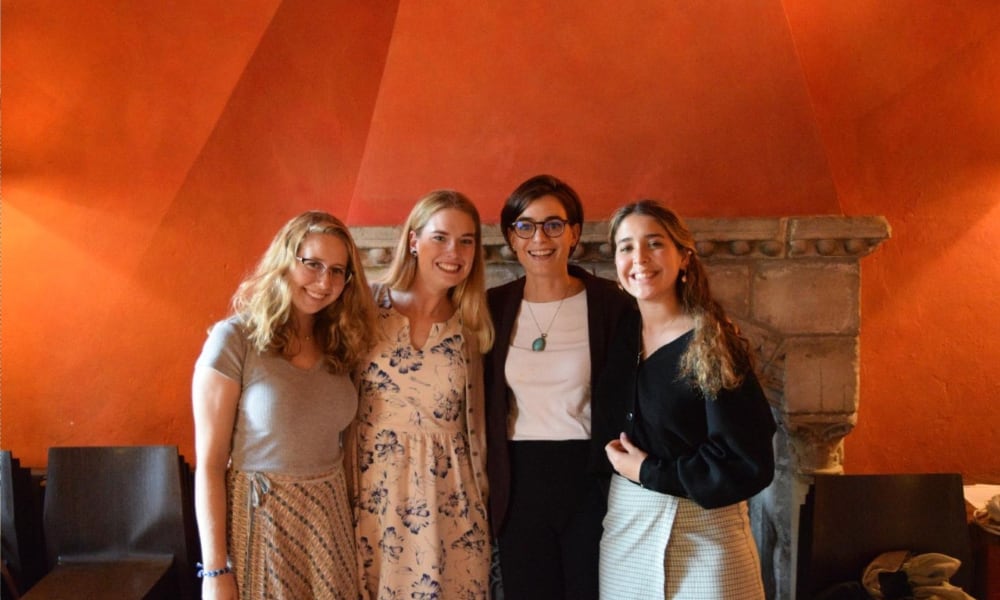Exploring Education
Discovering the European University Institute
M.A. in Political Science, European Union Policy Studies
By Sara Rzegocki
A short bus trip from Florence’s city center rests a prestigious European gem. Nestled in the Tuscan hills in the hillside town of Fiesole, the European University Institute (EUI) overlooks the city of Florence. Researchers, practitioners, and students from across and beyond Europe flock to the EUI to gain understanding on the forces that make the EU tick. For years, JMU’s EUPS have had access to resources at the EUI. They continue to use the institute’s library, to attend various EUI lectures and events, and, provided that there are matches between EUI needs and EUPS student resources, to intern with various EUI units and projects.
JMU’s relationship with the institute is facilitated by close collaboration with EUI affiliates. Dr. Silvia D’Amato, for example, is currently serving as both a JMU professor and an EUI Max Weber Fellow. Dr. D’Amato encourages our class to visit the EUI and participate in various discussions and presentations that they host. In early October, some of my classmates and I seized her recommendations. We attended an EUI-hosted workshop on Hybrid Governance and Limited Statehood in the Middle East and Northern African (MENA) region. The workshop contained four different panels and lasted the entire day. My classmates and I attended the panel on “the role of international actors,” whose discussant was Dr. D’Amato herself. As a discussant, she critiqued three different papers that are in the process of further research and are projected to be published.
My classmates and I were thrilled about this opportunity. In Dr. D’Amato’s POSC 605 (Comparative European Politics) class this fall, one of the class requirements is to practice the role of a discussant. At the EUI workshop, we had a chance to observe academic panels and the discussant role at first hand - this helped us to learn how to carry out the role in our class. Fortunately for us, we only have to analyze one paper instead of three!
On the day of the event, we caught a bus up to the EUI and took the scenic walk to Villa Schifanoia, where the political science department is housed. We entered into a grand room overlooking a beautiful garden. We met Dr. D’Amato, grabbed a biscuit with an espresso and took our seats.
Twenty international fellows sat around a massive rectangular table. As I settled into my seat in the back of the room, I could not help but get excited. The room hummed with activity and brought together a diverse and accomplished set of scholars--from countries like the United Kingdom, Spain, Italy, Turkey and Poland, from institutions like the London School of Economics and the Barcelona Center for International Affairs. I felt fortunate to be part of this accomplished international scene.
During the panel, three fellows from differing institutions presented their research. The topics ranged from international organizations interventions in Africa to mediation of conflicts in the Middle East, to Russian interference in MENA politics. I took notes throughout the presentations and during Dr. D’Amato’s critical feedback. As her students, we beamed with pride. Questions were taken at the end, and the session concluded with the fellows responding to the Dr. D’Amato’s feedback and the questions from the floor. The panel lasted close to two hours, but it felt like twenty minutes.
After the workshop, Dr. D’Amato gave us a tour of Villa Schifanoia. We walked through the garden, and she gave us a brief history on the EUI. She explained that the idea of an EUI was first discussed in the late 1940’s. However, the plans for the EUI were unfortunately delayed until the first institution was opened in Florence is 1976. As we walked, she pointed out the daycare, soccer fields and other villas in the distance. She also showed us where her office was.
We were buzzing with inspiration during the bus ride back. My classmates and I discussed new information we learned and connected it to what we were studying. We bounced ideas back and forth with each other about potential areas of research that we could pursue. The workshop was also valuable because we learned how to be a proper discussant, an important skill that is needed for our current work in the program and for our future professional endeavors.
The EUI is a wonderful and stimulating institution, and few American institutions are as closely tied to the institution as JMU. Current and future EUPS students would be remiss if they did not make the most of our structured relationship with the gem up the hill.
Sara Rzegocki is part of the 2019-2020 EUPS cohort. She graduated from JMU in 2019 with a major in Public Policy and Administration and a minor in Economics.
